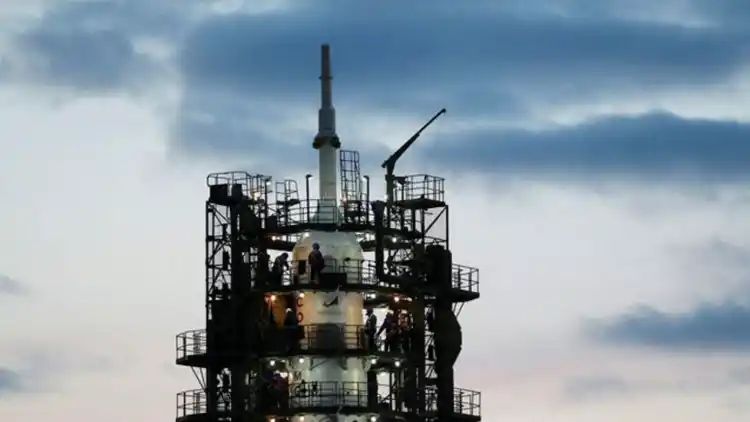Russia suffers another space setback as Soyuz aborted at last minute
Specialists work near the Soyuz MS-25 spacecraft following its launch cancellation at the Baikonur Cosmodrome, Kazakhstan, March 21, 2024. REUTERS/Pavel Mikheyev
A Russian Soyuz spacecraft meant to carry three astronauts to the International Space Station went through a rare abort on the launchpad just 21 seconds before it was supposed to launch.
Yuri Borisov, head of the Russian space agency Roscosmos, later put out a statement saying the launch was postponed due to a voltage issue with the battery.
“The reason has been identified; we just discovered at a meeting of the state commission that the reason was a voltage drop in the chemical current source. The automation worked during the launch control and prevented the ship’s systems from malfunctioning. The crew is safe, left the rocket and went to remove their spacesuits,” said Borisov, according to an agency statement. (Translated from Russian)
The abort command was triggered by an automatic system shortly before the engines were supposed to ignite, when two umbilical connections were retracted from the rocket. Roscosmos sent engineers to the launchpad at Baikonur Cosmodrome in Kazakhstan to ensure the vehicle was safe and to extract the crew.
“The Soyuz launch to the space station has been aborted. So, no visitors to the International Space Station today. The next opportunity to launch, pending resolution of what happened today, would be Saturday morning,” said NASA spokesperson Rob Navias during live commentary, according to Space.com.
This is the latest in a series of space setbacks for a country that was once a leading pioneer in space exploration. Earlier this month, space officials from the country confirmed a continuing air leak from the Russian section of the International Space Station. Astronauts first reported a leak in the Zvezda module in August 2020 and tried to fix it at the time. Another potential leak was found there in November 2021.
Farther from Earth and low-Earth orbit, Russia’s attempt at a lunar landing ended in misery in August last year when Luna-25, the country’s first Moon probe since 1974, crashed onto the lunar surface. If it had succeeded, it would have beaten India’s Chandrayaan-3 to become the first spacecraft to land near the Moon’s south pole.






